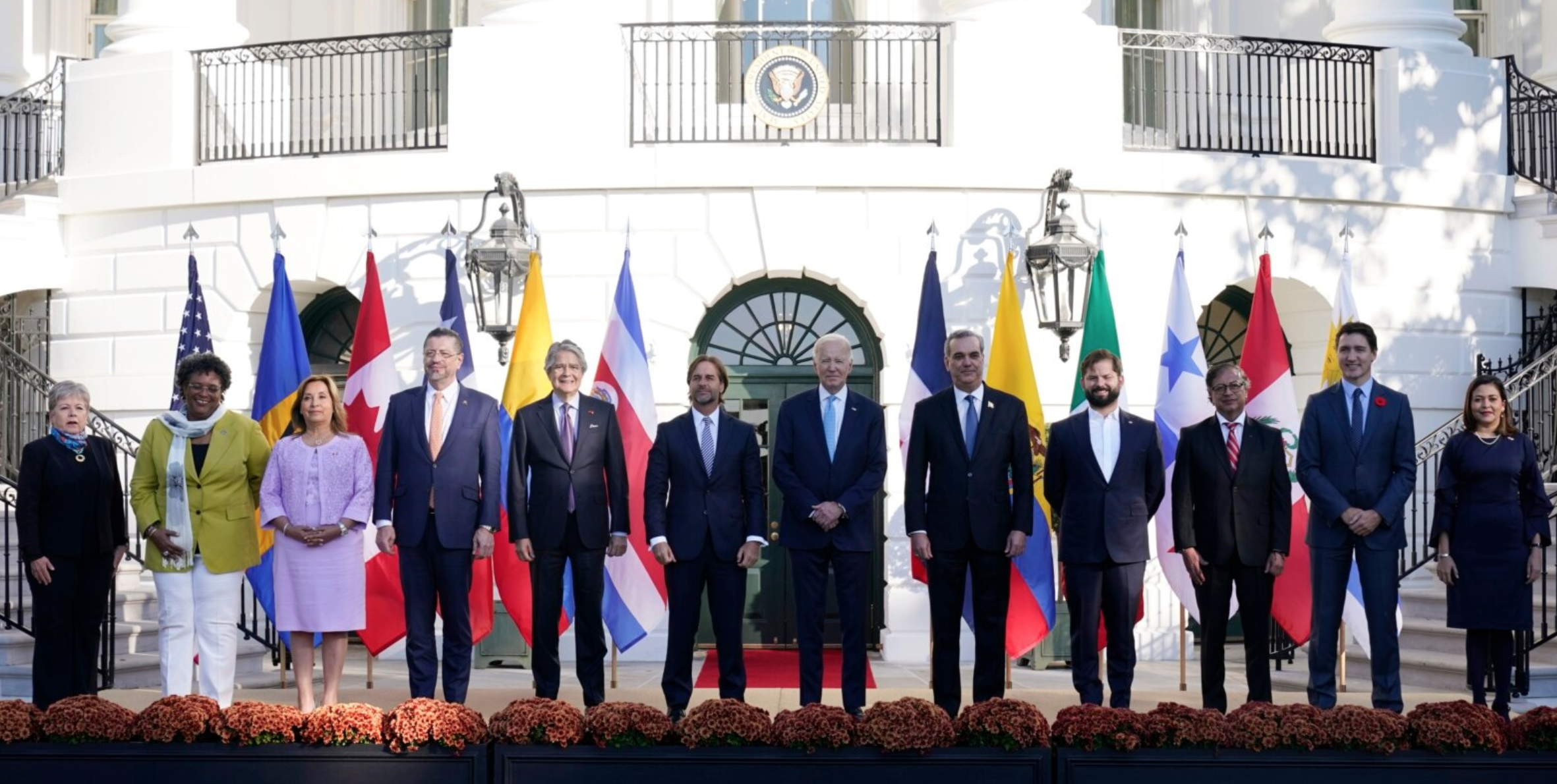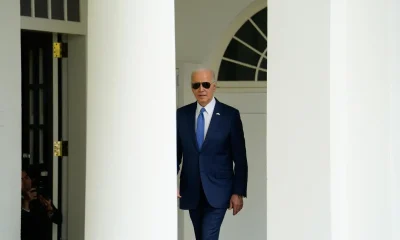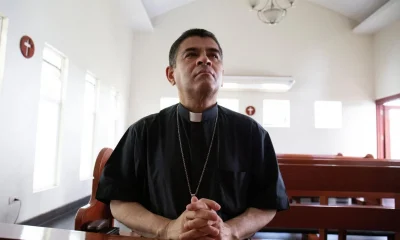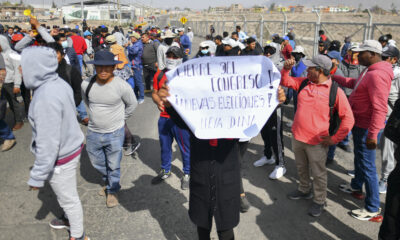International
2023, a year of domestic and foreign policy challenges for the White House

December 31 |
The third year of Democrat Joe Biden’s administration in the United States was marked by challenges, both in the domestic arena and in foreign policy.
Intense negotiations with the Republican caucus in Congress, summits, a surprise visit to war-torn Kiev, strained relations with China and Russia and growing turmoil in the Middle East were some of the milestones of 2023 for the White House, which also featured colorful moments in a year that serves as a prelude to the crucial 2024 where the US will decide who will be the next president.
In February, during his trip to Europe to mark the one-year anniversary of the start of the Russian invasion of Ukraine, Joe Biden surprised the world with a visit to Kiev, kept secret until the last moment.
The images of Biden and his Ukrainian counterpart, Volodymyr Zelenskyy, walking as anti-aircraft sirens blared were memorable. It was the first time in modern history that a U.S. president had traveled to a country at war without a U.S. military presence. With this, the Democratic president showed that he was serious about “unwavering support” for Ukraine vis-à-vis Russia.
The controversial immigration issue, the economy and foreign policy were among the central themes of Biden’s second State of the Union address since he became president.
The Democratic leader emphasized the need to pass the immigration reform he proposed before Congress and called for unity in the face of the economic challenge posed by the war in Ukraine, while praising his administration’s achievements in managing inflation, fuel prices, wage stability and job growth.
The division in Congress, with the Senate in the hands of Democrats and a polarized House with a slight Republican majority, has led to differences with the Democratic administration, which has translated into resistance to legislation and packages presented by Biden before lawmakers.
The far-right wing of the Republican Party has been a thorn in the President’s side. The battle to reach an agreement to prevent the country from defaulting on its debt, postponed until January 2025, was followed by the negotiation to keep the government open – postponed until the beginning of 2024 -, and now the refusal of Republicans to approve an emergency package with funds for Ukraine and Israel if immigration policy is not tightened, particularly on the southern border.
Just before the year-end recess, the House voted and approved formally initiating an investigation to determine a possible impeachment of Biden. The investigation will be aimed at determining whether the President and his son Hunter Biden colluded to benefit from Biden’s contracts with foreign companies during Biden’s time as Vice President.
In April, President Joe Biden announced that he would run for re-election in 2024, clearing up doubts as to whether the Democratic leader would return to fight for the White House or leave the way open to other aspirants of his party.
Age is one of the most sensitive issues facing the 81-year-old veteran politician. In his campaign, Biden has focused on highlighting the achievements of his first term, his career as a legislator and more recently, he has insisted that he is the best alternative to his predecessor Donald Trump, going so far as to point out that he would not have thought of running again had it not been for the “threat to democracy” that a second Trump term would mean.
Ukrainian President Volodymyr Zelenskyy’s visits to Washington served as material evidence of the Biden administration’s backing for Kiev in its war against Russia. Zelenskyy made two trips to the U.S. in 2023, both in the space of three months and coinciding with discussions in Congress on aid to the Ukrainian cause.
Zelenskyy has been received at the White House three times since the Russian invasion began in February 2022. The first visit this year was in September, following his participation in the United Nations General Assembly. The second was in December, returning from Zelenskyy’s first trip to Latin America after the start of the war. In total, Biden and Zelenskyy have met in person seven times during the U.S. president’s administration.
In a historic moment in 2023, seven Latin American heads of state arrived in Washington to meet with President Joe Biden at the first edition of the Leaders’ Summit of the Partnership for Economic Prosperity of the Americas.
Biden and his counterparts from Costa Rica, Uruguay, Peru, Chile, Colombia, Ecuador, Dominican Republic, Canada and Barbados, announced new joint strategies that will guarantee the investment of millions of dollars in sustainable projects, human capital formation and migration solutions for the region.
In addition, Biden announced a new investment platform that will channel “billions of dollars into building sustainable infrastructure”, organized by the US government and the Inter-American Development Bank (IDB).
Echoes of Israel’s all-out war against Hamas in Gaza following the surprise attacks of October 7 have reached the other side of the world. The US, Tel Aviv’s main ally, was quick to show its support for the Israeli forces, although more than a month after the start of the campaign against the militant group, the discourse has changed.
From irresolute support, the Biden administration maintains its position that Israel has the right to defend itself but has now called on the Israeli government to be more precise in its attacks. According to the health ministry in Gaza, bombings against Hamas have already killed more than 18,000 Palestinians and displaced thousands in the enclave, home to some 2.3 million people.
International pressure weighs on Tel Aviv, while at home, President Joe Biden faces criticism from his Muslim voters, one year before the 2024 presidential election.
It was not all high-level meetings and negotiations at the White House. In 2023, the presidential residence celebrated the nation’s top traditions and opened its gardens for Americans to tour the history and of the iconic mansion in both spring and fall.
From the traditional Thanksgiving two-turkey pardoning ceremony, holiday decorations, the lighting of the National Christmas Tree to an ice skating rink for children of public servants, front-line military workers and school children, the White House also wanted to mark festive moments in the year.
International
U.S. Senate Rejects Budget, Bringing Government Closer to Shutdown Amid DHS Dispute

The U.S. Senate voted on Thursday against a budget proposal in a move aimed at pressuring changes at the Department of Homeland Security (DHS), following the killing of two civilians during a deployment of immigration agents in Minneapolis.
All Senate Democrats and seven Republican lawmakers voted against the bill, which requires 60 votes to advance, pushing the country closer to a partial government shutdown that would cut funding for several agencies, including the Pentagon and the Department of Health.
The rejection came as Senate leaders and the White House continue negotiations on a separate funding package for DHS that would allow reforms to the agency. Proposed measures include banning Immigration and Customs Enforcement (ICE) agents from wearing face coverings and requiring them to use body-worn cameras during operations.
The vote took place just hours after President Donald Trump said he was “close” to reaching an agreement with Democrats and did not believe the federal government would face another shutdown, following last year’s record stoppage.
“I don’t think the Democrats want a shutdown either, so we’ll work in a bipartisan way to avoid it. Hopefully, there will be no government shutdown. We’re working on that right now,” Trump said during a Cabinet meeting at the White House.
International
Trump Says Putin Agreed to One-Week Halt in Attacks on Ukraine Amid Extreme Cold

U.S. President Donald Trump said on Thursday that he secured a commitment from Russian President Vladimir Putinto halt attacks against Ukraine for one week, citing extreme weather conditions affecting the region.
“Because of the extreme cold (…) I personally asked Putin not to attack Kyiv or other cities and towns for a week. And he agreed. He was very pleasant,” Trump said during a Cabinet meeting broadcast by the White House.
Trump acknowledged that several advisers had questioned the decision to make the call.
“A lot of people told me not to waste the call because they wouldn’t agree. And he accepted. And we’re very happy they did, because they don’t need missiles hitting their towns and cities,” the president said.
According to Trump, Ukrainian authorities reacted with surprise to the announcement but welcomed the possibility of a temporary ceasefire.
“It’s extraordinarily cold, record cold (…) They say they’ve never experienced cold like this,” he added.
Ukrainian President Volodymyr Zelensky later commented on the announcement, expressing hope that the agreement would be honored.
International
Storm Kristin Kills Five in Portugal, Leaves Nearly 500,000 Without Power

Storm Kristin, which battered Portugal with heavy rain and strong winds early Wednesday, has left at least five people dead, while nearly half a million residents remained without electricity as of Thursday, according to updated figures from authorities.
The revised death toll was confirmed to AFP by a spokesperson for the National Emergency and Civil Protection Authority (ANPEC). On Wednesday, the agency had reported four fatalities.
Meanwhile, E-Redes, the country’s electricity distribution network operator, said that around 450,000 customers were still without power, particularly in central Portugal.
Emergency services responded to approximately 1,500 incidents between midnight and 8:00 a.m. local time on Wednesday, as the storm caused widespread disruptions.
The Portuguese government described Kristin as an “extreme weather event” that inflicted significant damage across several regions of the country. At the height of the storm, as many as 850,000 households and institutions lost electricity during the early hours of Wednesday.
Several municipalities ordered the closure of schools, many of which remained shut on Thursday due to ongoing adverse conditions.
Ricardo Costa, regional deputy commander of the Leiria Fire Brigade, said residents continue to seek assistance as rainfall persists.
“Even though the rain is not extremely intense, it is causing extensive damage to homes,” he noted.
In Figueira da Foz, a coastal city in central Portugal, strong winds toppled a giant Ferris wheel, underscoring the severity of the storm.
-

 Central America4 days ago
Central America4 days agoGuatemala seizes over a ton of cocaine hidden in flour at Pacific port
-

 International5 days ago
International5 days agoDelcy Rodríguez seeks political agreements after Maduro’s ouster
-

 International4 days ago
International4 days agoHistoric snowstorm paralyzes Toronto after 60 centimeters of snow
-

 Central America3 days ago
Central America3 days agoGuatemala Police Arrest Prison Guard Caught in the Act of Extortion
-

 Central America3 days ago
Central America3 days agoHonduras swears in conservative president Asfura after disputed election
-

 Central America3 days ago
Central America3 days agoBukele leads public trust rankings as UCA survey highlights gains in security
-

 International4 days ago
International4 days agoSpain’s irregular migrant population rises to 840,000, study finds
-

 International5 days ago
International5 days agoFederal immigration agents kill man in Minneapolis, sparking protests and outrage
-

 International2 days ago
International2 days agoFootball Fan Killed in Clashes After Colombian League Match
-

 International3 days ago
International3 days agoWinter Storm Fern Leaves 30 Dead and Over One Million Without Power Across the U.S.
-

 Central America2 days ago
Central America2 days agoGuatemala President Says Starlink Terminal Found Inside Prison
-

 Sin categoría3 days ago
Sin categoría3 days agoEight Killed in Series of Armed Attacks in Ecuador’s Manabí Province
-

 International3 days ago
International3 days agoDoomsday clock moves to 85 seconds before midnight amid rising global risks
-

 International4 days ago
International4 days agoRights group says nearly 6,000 killed in Iran protest crackdown
-

 International2 days ago
International2 days agoMissing Spanish Sailor Rescued After 11 Days Adrift in Mediterranean
-

 International2 days ago
International2 days agoRubio Says U.S. Could Participate in Follow-Up Russia-Ukraine Talks
-

 International3 days ago
International3 days agoSpain approves plan to regularize up to 500,000 migrants in Historic Shift
-

 Sin categoría3 days ago
Sin categoría3 days agoEl Salvador Launches Fourth Year of Ocean Mission to Protect Marine Ecosystems
-

 International4 days ago
International4 days agoVenezuela frees at least 80 political prisoners, NGO says
-

 International4 days ago
International4 days agoEU launches new probe into X over AI-generated fake nude images
-

 International16 hours ago
International16 hours agoU.S. Senate Rejects Budget, Bringing Government Closer to Shutdown Amid DHS Dispute
-

 International4 days ago
International4 days agoSevere winter storm grips U.S., leaves multiple dead as extreme cold persists
-

 International4 days ago
International4 days agoFrance debates ban on social media for children under 15
-

 International16 hours ago
International16 hours agoStorm Kristin Kills Five in Portugal, Leaves Nearly 500,000 Without Power
-

 International16 hours ago
International16 hours agoMan Arrested After Vehicle Crashes Into Jewish Institution in Brooklyn
-

 International16 hours ago
International16 hours agoTrump Says Putin Agreed to One-Week Halt in Attacks on Ukraine Amid Extreme Cold




































